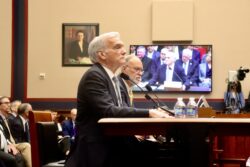In October, the Office of Housing and Conference Services announced in a broadcast e-mail that the University would be able to provide on-campus housing to all students during the 2003-2004 school year. It thought the completion of the Southwest Quadrangle project in the fall of 2003 would provide the extra space needed to house all students on campus.
“There is no need to look for off-campus housing. With the opening of our new residence hall, we will have enough space to accommodate all students who want to live on campus,” Director of Housing Services Shirley Menendez said in the e-mail at the time.
As a result of the current building project, the University thought it was faced with an unusual problem. Instead of scrambling to find more space for students, the administration was determining what to do with extra on-campus rooms.
The response from upperclassmen was far higher than expected and, as a result, over two hundred students who were guaranteed on-campus housing are now forced to live off campus.
The Housing Office seems to have two priorities with the Southwest Quadrangle construction. The first was to pay off the building’s debt, which requires high occupancy, and the second was meeting the needs of students for on-campus housing.
Students in the Alliance for Local Living, a group working to make sure students live on campus, are going to try to bring executive director of facilities and housing services Karen Frank and Menedez to its next meeting to answer questions about how the housing process encountered controversy this year and to determine if there is any possible way more students could be housed on campus.
In Feb. 2000, over 200 rising juniors had their applications for third-year housing preference deferred to their senior year. As a result, the students had to find off-campus housing for the next academic year.
Students who found out that housing for the next year was not guaranteed were mostly confused and surprised by the prospect of looking for off-campus housing so late in the year. Also, students were frustrated by a lack of information from the university on the housing shortage.
Following this notice, over 100 students met University President Leo J. O’Donovan, S.J. in Healy Circle to protest the handling of the housing situation. Meanwhile, housing officials scrambled to provide increased services and viable off-campus housing options for the 237 sophomores denied junior preference for on-campus housing the following year. That rally was organized by Students Demanding Housing Solutions, a group formed in response to the University’s mishandling of the housing situation that resulted in 237 sophomores being denied junior preference. Since then all three founders of the group have graduated.
A lot of problems could have been avoided three years ago if Office of Housing and Conference Services had informed students of the shortage earlier in the year.
Georgetown has been through this mistake in the past and it needs to use the solutions that worked back then as a remedy. Administratiors need to admit that they made a mistake and take steps to accomadate students. It is unacceptable that a housing crisis of almost the same nature has occured twice in three years.



